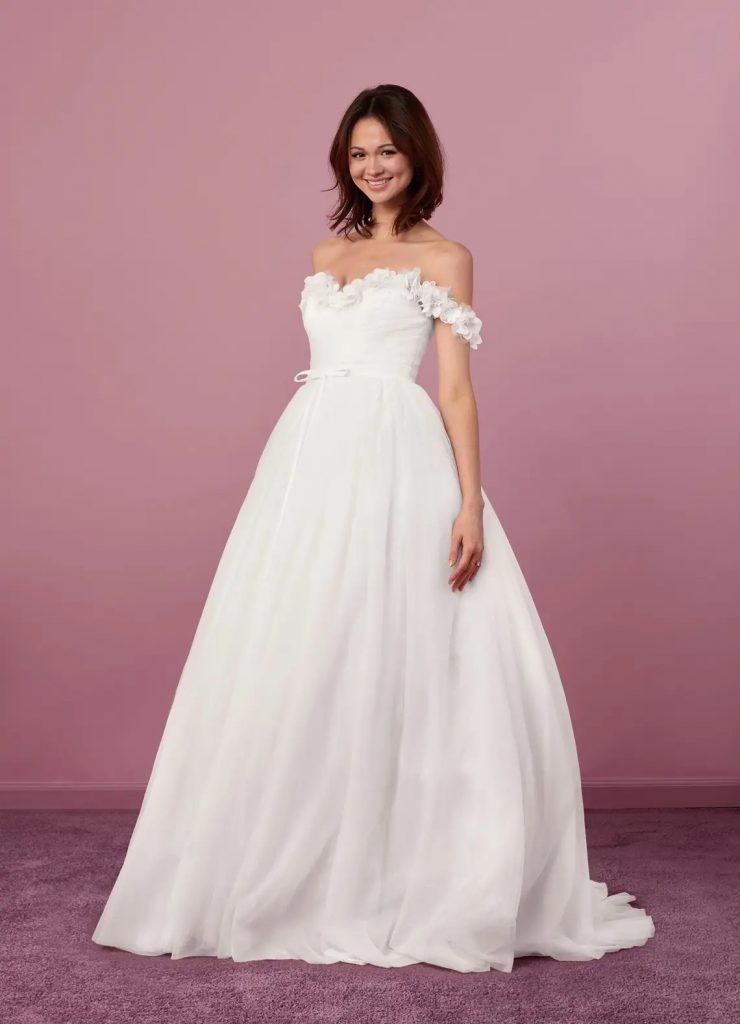How to Photograph Your Wedding Dress for Social Media or Your Wedding Album
Your wedding dress isn’t just a garment—it’s a work of art and a reflection of your love story.
Capturing it beautifully in photos lets you relive those details for years to come. Meanwhile, your bridesmaid dresses help complete the visual harmony of your big day.
Customizing them to match your theme—without losing their individuality—creates a truly cohesive look.This guide covers both: how to photograph your wedding dress like a pro and how to make your bridesmaid dresses stand out within your chosen theme.
How to Photograph Your Wedding Dress
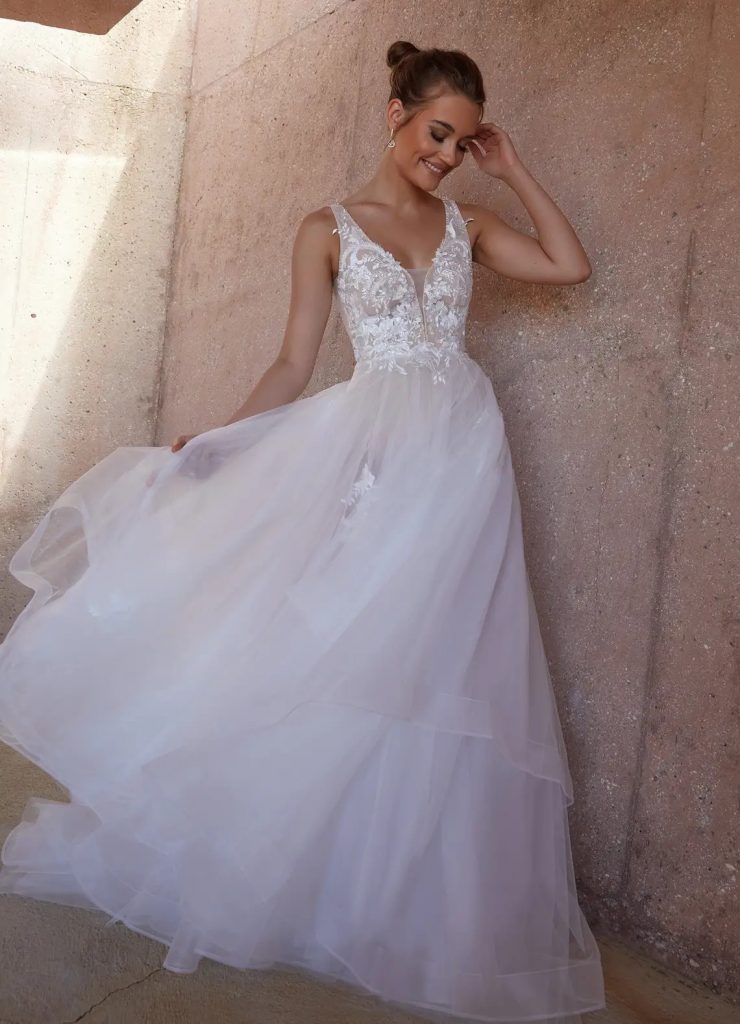
Before you step into your dress, capture it in a way that tells its story—texture, movement, and emotion. These photos are timeless treasures for your wedding album and social media.
Plan the Photography Setup
Good photos start with thoughtful preparation.
Key steps to prepare:
- Choose the right location: Pick a clean, well-lit area (near a window or balcony).
- Use natural light: Morning or late afternoon light adds softness and warmth.
- Declutter the background: Remove distracting objects or colored fabrics.
- Add subtle accents: Include your veil, bouquet, or shoes in the frame for balance.
Hang the Dress Correctly
Hanging your gown properly shows off its full beauty and structure.
Tips for the perfect hanging shot:
- Use a sturdy padded hanger to support the weight evenly.
- Straighten the train and smooth out wrinkles.
- Keep the hanger hook out of view or hidden behind fabric.
- Position near a light source, such as a window, to highlight details.
- Avoid harsh overhead light—it flattens the fabric.
Pro Tip: Photograph the gown before steaming it, then again after pressing—it captures both the anticipation and the perfection.
Capture Fabric Details and Textures
Every gown has a signature texture—lace, satin, tulle, or chiffon. Close-up shots make those details shine.
Angles to capture:
- Lace patterns and beadwork: Zoom in on the bodice or sleeves.
- Train or hemline: Focus on the layering or embellishments.
- Buttons and zippers: Add character to a detail collage.
- Veil embroidery or sparkle: Backlight it for shimmer.
| Fabric Type | Best Lighting | Ideal Angle | Effect |
| Lace | Side light | Macro close-up | Shadows reveal patterns |
| Satin | Soft diffused | Slightly above waist | Highlights smoothness |
| Tulle | Backlight | Eye-level | Creates dreamy glow |
| Silk | Natural window | 45° angle | Shows flow and sheen |
Include the Dress in Storytelling Shots
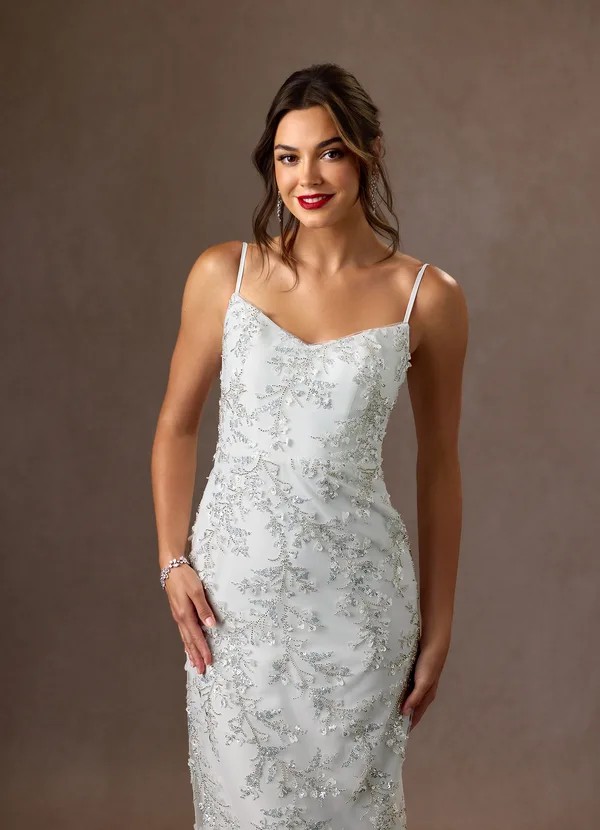
Your dress deserves to be part of your narrative—before and after you wear it.
Try these storytelling moments:
- Hanging from a vintage door or tree branch outdoors.
- Draped across a velvet couch or bed.
- Laid beside wedding invitations and jewelry.
- Reflected in a mirror while you get ready.
- Held gently by your bridesmaids before dressing.
These add emotional depth and create variety for both albums and reels.
Use Natural Light Over Flash
Artificial flash can distort color and shine. Soft natural light flatters white and ivory tones without glare.
Lighting checklist:
- Face the gown toward the window (not away).
- Use sheer curtains to diffuse harsh rays.
- For golden tones, shoot during the “golden hour” (about one hour before sunset).
- Avoid direct midday sunlight—it casts hard shadows.
Capture Movement and Flow
Don’t let your photos look static—show how your gown moves.
Movement shots to try:
- Twirl the skirt slowly for a floating effect.
- Walk toward a mirror or down a hallway.
- Let your veil catch a soft breeze.
- Capture fabric ripples mid-step.
Use slow shutter speeds for a romantic blur or quick snaps for crisp flow.
Frame Your Silhouette
A wedding dress shot isn’t complete without a silhouette—especially if it has a train or dramatic back.
Silhouette shot ideas:
- Stand before a bright window for backlight.
- Hold bouquet loosely to one side.
- Let light outline your figure gently.
- Avoid heavy flash—use exposure control for softness.
Don’t Forget the Emotional Shots
After all the perfect poses, the best photos are the emotional ones.
Moments worth capturing:
- Your mother or bridesmaid zipping the gown.
- You touching the fabric with a smile.
- Tears or laughter while dressing.
- The final glance in the mirror before you walk out.
These transform your wedding dress from an outfit into a memory.
Edit with a Light Hand
When posting to social media, keep editing minimal. Your gown’s natural tones should shine.
Editing tips:
- Adjust exposure slightly to brighten whites.
- Reduce harsh contrast—soft, even tones feel timeless.
- Use consistent filters across your posts for aesthetic unity.
- Crop gently; avoid removing key details like lace or hemline.
How to Make Your Bridesmaid Dresses Unique to Fit Your Wedding Theme
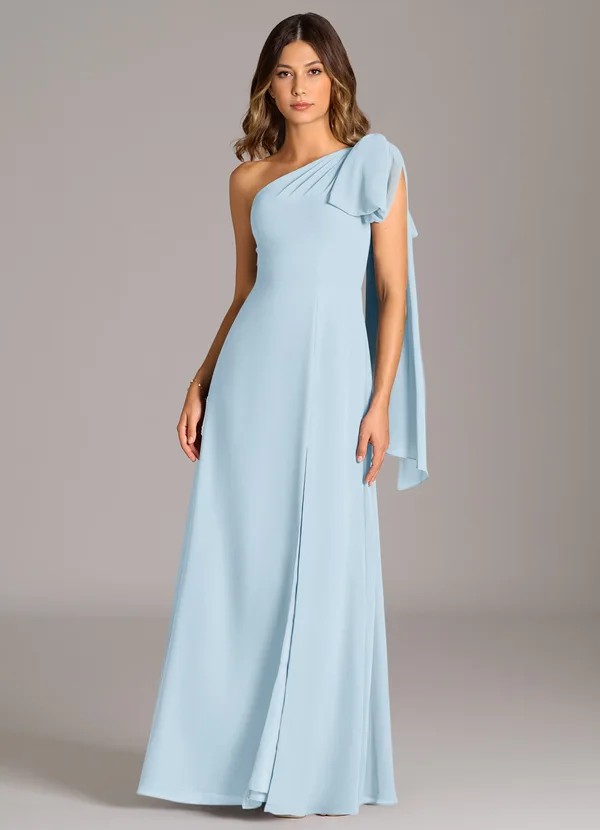
Your bridesmaids represent your style, color story, and creativity. The challenge? Making them look coordinated—but not cloned.
By personalizing details, colors, and textures, you can match your theme while letting each bridesmaid’s personality shine.
Start With Your Wedding Theme
Every decision stems from your theme.
Common Wedding Themes & Dress Directions:
| Theme | Color Palette Ideas | Bridesmaid Dress Style Suggestions |
| Classic Elegance | Ivory, Champagne, Blush | Floor-length satin or chiffon |
| Boho Garden | Sage, Terracotta, Dusty Blue | Flowy A-line, lace or floral prints |
| Modern Minimalist | Charcoal, Mauve, Sand | Sleek slip dress, structured crepe |
| Beach Romance | Sky Blue, Coral, Soft Tan | Breezy halter or midi wrap |
| Vintage Glam | Burgundy, Gold, Navy | Velvet, sequined, or off-shoulder |
Tip: Pick a color family first, then vary tones across bridesmaids for dimension.
Mix Silhouettes for Body Inclusivity
Not everyone feels comfortable in the same cut. Mixing silhouettes ensures every bridesmaid looks confident.
Ideas:
- Combine A-line, wrap, and one-shoulder cuts.
- Keep fabric and color consistent for cohesion.
- Let each person pick the neckline they love.
- Use matching belts or sashes to unify the look.
| Body Type | Best Silhouette | Why It Works |
| Petite | Empire or short A-line | Lengthens frame |
| Curvy | Wrap or V-neck | Accentuates waist |
| Tall | Column or halter | Highlights natural height |
| Pear-shaped | Off-shoulder A-line | Balances proportions |
Play With Color and Texture
Uniform color isn’t the only way to match. Use tone variation or texture blending to make it modern.
Try:
- Gradient shades of one color (e.g., dusty pink to rose).
- Same hue, different fabrics—chiffon, satin, velvet.
- Metallic accents for evening weddings.
- Floral or embroidered detailing for outdoor ceremonies.
This approach creates visual depth without breaking theme consistency.
Add Personal Touches
Allow small customizations to make each bridesmaid feel special.
Personalization ideas:
- Custom jewelry or hair accessories.
- Monogrammed shawls or ribbons.
- Mix-and-match earrings or corsages.
- Personalized clutches in your theme color.
You’ll maintain harmony while celebrating individuality.
Coordinate Bouquets and Accessories
Accessories can tie your whole bridal party together even if dresses differ slightly.
To keep consistency:
- Choose matching flower palettes but vary bouquet sizes.
- Use the same metallic tone for jewelry (silver, gold, rose gold).
- Coordinate shoes or wraps subtly—don’t demand uniformity.
- Keep makeup tones complementary, not identical.
Consider Fabric and Season
Fabric choice connects your theme to the setting. A summer wedding calls for breathable materials, while winter weddings benefit from luxurious textures.
| Season | Recommended Fabrics | Why It Fits |
| Spring | Chiffon, Organza | Light and airy |
| Summer | Satin, Crepe | Cool and smooth |
| Fall | Tulle, Georgette | Adds movement, warmth |
| Winter | Velvet, Heavy Silk | Feels rich and cozy |
Match With Venue Aesthetic
The environment influences everything—lighting, colors, and backdrop.
Examples:
- Rustic barn: Earth tones, lace trims, or floral prints.
- Urban loft: Sleek silhouettes, solid modern hues.
- Beach: Flowy fabrics and pastel tones.
- Garden: Soft greens, flower-inspired designs.
Add a Cohesive Detail
A small repeated element makes your group visually unified.
Examples of cohesive elements:
- Matching waist sashes or flower pins.
- Same neckline trim or button detail.
- Identical bouquets tied with theme-colored ribbon.
- Similar earrings or hair vines.
Embrace Mismatched Styling (Done Right)
The modern trend of “mismatched bridesmaid dresses” gives freedom without chaos.
Rules for a cohesive mismatched look:
- Stick to one color palette.
- Limit variation to two dress lengths max.
- Keep one design element consistent (fabric or neckline).
- Avoid mixing prints and solids unless curated carefully.
Include the Bridesmaids in the Decision
When bridesmaids feel heard, they feel confident.
Collaborate by:
- Sharing mood boards and fabric samples.
- Asking for comfort preferences.
- Trying dresses together for visual harmony.
Confidence photographs better than perfection.
Capture Your Bridesmaid Dresses in Photos
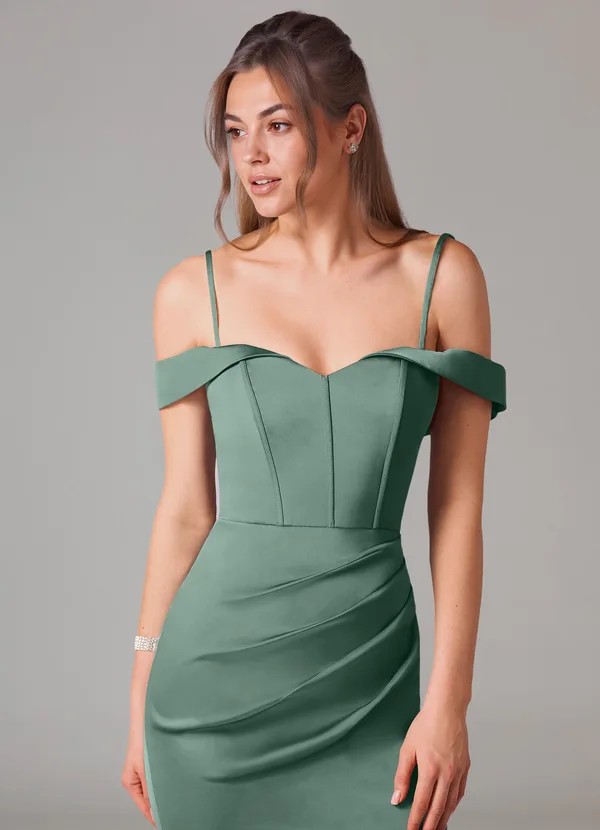
You’ve chosen beautiful dresses—now make them shine in your wedding album.
Group Photography Tips:
- Arrange by color gradient or alternating tones.
- Shoot both posed and candid moments.
- Capture detail shots: sleeves, backs, bouquet coordination.
- Photograph bridesmaids from slightly above eye level for flattering posture.
Fun group poses:
- Walking toward the camera laughing.
- All looking at the bride’s dress train.
- Circle around the bride with bouquets raised.
- Holding hands and glancing over shoulders.
Quick Styling & Photography Checklist
- Clean background and good natural light.
- Capture fabric texture and movement.
- Include candid and emotional moments.
- Mix silhouettes but stay within one theme.
- Add accessories that complement, not compete.
- Keep color gradients smooth and natural.
- Edit gently to preserve real tones.
Complete Wedding Dress & Bridesmaid Style Plan
| Category | Focus Area | Key Tips | Visual Goal |
| Wedding Dress Photography | Lighting, Composition | Use natural light, capture texture, movement | Elegant and emotional |
| Bridesmaid Dresses | Theme Coordination | Mix silhouettes, unify color palette | Cohesive yet personal |
| Accessories | Cohesion | Match metals or bouquet accents | Balanced group photos |
| Editing | Style Consistency | Light, natural adjustments | Timeless album feel |
Final Thoughts
Every detail—from the shimmer of your gown to the soft hues of your bridesmaid dresses—tells part of your love story.By following these photography and styling steps, you’ll create imagery that feels natural, artistic, and true to your theme.
Focus on emotion and authenticity over perfection.Because when your album reflects joy, love, and personality, it becomes more than just photos—it becomes the visual heartbeat of your wedding day.
Frequently Asked Questions
How can I photograph my wedding dress without a professional photographer?
Use a tripod or steady hand, position near a window, and take multiple shots with soft natural light. A phone camera works fine if the lighting is good.
What is the best color background for dress photos?
Neutral backgrounds—white, beige, or light gray—help your dress pop without color cast.
Can bridesmaids wear different shades of the same color?
Yes! Monochromatic palettes add dimension and photograph beautifully when arranged thoughtfully.
How can I make mismatched bridesmaid dresses look intentional?
Keep one unifying element—like fabric type, bouquet style, or jewelry tone—to tie the group together.
Should bridesmaids wear the same hairstyle?
Not necessarily. Similar textures (all soft curls or sleek updos) create unity while letting each person choose comfort.
How do I show my wedding dress on social media without revealing too much before the ceremony?
Post artistic sneak peeks—like the lace detail, hanger shot, or close-up of the train—without showing the full dress.
